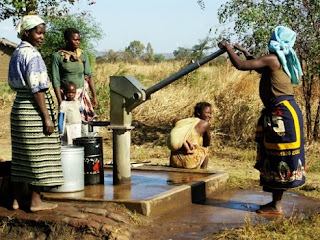Sanitation and Ethnography in Africa
Since the first lecture in Water and Development in Africa, I immersed myself in reading a variety of academic papers, noting down all the points/arguments of the scholars. This blog is sparked when I was reading Informal Urban Sanitation: Everyday Life, Poverty, and Comparison by McFarlane et al. (2014) that ethnography could be drawn on as one of the methods to do geographic research. As I can recall, this term 'ethnography' appeared in my academic life when I was doing Practice of Geography when which was my second year at UCL. I thought it would only a component of that module and I would not encounter the concept again. But I met ethnography again in the paper and was amazed by what ethnography could do in terms of analysing the wider complications of sanitation.
 |
| Fig.1: The use of ethnography in water researches - women chatting when withdrawing water |
Looking at the methodological literature, it would be nearly impossible to find a concrete definition of 'ethnography', as it is defined in a number of ways with different definitions having different focuses (Hammersley, 2017). Hammersley (2017) put different features of the definition together as followed: relatively long data collection compared to other research methods, natural settings, dependency on observation and engagement with people, a range of data would be employed, the emphasis of what is going on, holistic in nature, and the significance of the meanings people give to objects. I was surprised by the utility and the effectiveness of the research method when actualising the untouchable power relations in the society.
As illustrated by McFarlane et al., the close attention to how people interact with sanitation help us to understand how it is 'produced, transformed and contested (2017: 990). In addition, immersing in the environment also helps to have a closer examination on how changes occur in sanitation as a whole in the society and what the roles of people are over time and space (McFarlane et al., 2014). In doing so, forms of sanitation practices that fit with the cultural traditions of the locale, as well as more adequate consideration on wealth gap and distribution of sanitary facilities could be gained and devised to have a better sanitation improvement plan (Mehta and Movik, 2012).
After being surprised by what ethnography can achieve in terms of making people's feelings of ordinary life clear, I found another article talking about sanitation in Africa also using ethnography methods - On Sanitation: A Memory Ethnography by Srivastava (2014). Growing up in Old Delhi and doing the ethnography research in Old Delhi, there was vivid description of what the sanitation in Old Delhi smells, feels, and looks like. This is my first my of feeling the real sanitation situation in Africa since studying the module. Confused about why sanitation is a question of dignity (McFarlane et al., 2014), the real-life examples such as the idea of inviting friends to the neighbourhood is given up considering the neighbourhood is 'crowded, with litter scattered all around, and lacked privacy' in the article by Srivastava (2014: 276) made me appreciate more about the sanitation problems in Africa.
The problems of sanitation are pressing. In 1990, 2.5 out of 5.3 billion people lacked access to sanitary facilities (McFarlane et al., 2014). By 2008, the proportion had reduced but the total number of people lacking sanitation increased from 2.6 billion to 6.7 billion (Lane, 2012). Dire health consequences such as diarrhea are caused as a result of having food or water contaminated by faecal matter. It is noted that diarrhea kills a child every fifteen seconds, and the number killed in a decade exceeds all World War two deaths (George, 2008).
These statistics made me feel more about the importance of the use of ethnography in sanitation research in Africa. Sanitation leaks to the every aspect of people's lives, and its problems are pressing in Africa. More academic works involving ethnography and sanitation in Africa should be done, understanding the power relations and how people's behaviours have changed sanitary situations over time and space. In this way, more adequate down-to-the-top approaches could be developed to mitigate the problem and save lives.


Thank you for sharing your thoughts about ethnography in researching sanitation problems in Africa. Critically, would you think ethnography is subjective and probably abuse the research results?
回复删除Hi Cecilia! Thank you for your comment! From my point view, ethnography enables us to view the processes of sanitation with personal experiences and perspectives. These personal things make ethnography particularly suitable for sanitation investigation, in a sense that sanitation is felt, smelt, seen by real people who are living in the research spot.
删除Different ethnographers with different age, ethnicity, class, income level and gender would have different perceptions of sanitation in the same street, making the complexity of sanitation more obvious and possibly pushing for the emergence of more thoughtful sanitation approaches.
The last but not the least, abundant ethnography research should be done in order to avoid the risk of being subjective.